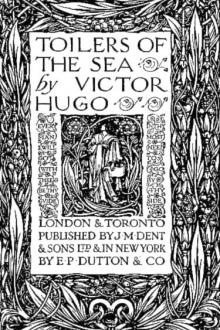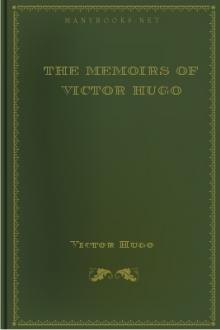Toilers of the Sea by Victor Hugo (trending books to read txt) 📕

- Author: Victor Hugo
- Performer: -
Book online «Toilers of the Sea by Victor Hugo (trending books to read txt) 📕». Author Victor Hugo
Almost without seeming to touch him this latent coalition had reduced him to rags; had left him bleeding, distressed, and, as it were, hors de combat, even before the battle. He laboured, indeed, not the less—without pause or rest; but as the work advanced, the workman himself lost ground. It might have been fancied that Nature, dreading his bold spirit, adopted the plan of slowly undermining his bodily power. Gilliatt kept his ground, and left the rest to the future. The sea had begun by consuming him; what would come next?
The double Douvres—that dragon made of granite, and lying in ambush in mid-ocean—had sheltered him. It had allowed him to enter, and to do his will; but its hospitality resembled the welcome of devouring jaws.
The desert, the boundless surface, the unfathomable space around him and above, so full of negatives to man's will; the mute, inexorable determination of phenomena following their appointed course; the grand general law of things, implacable and passive; the ebbs and flows; the rocks themselves, dark Pleiades whose points were each a star amid vortices, a centre of an irradiation of currents; the strange, indefinable conspiracy to stifle with indifference the temerity of a living being; the wintry winds, the clouds, and the beleaguering waves enveloped him, closed round him slowly, and in a measure shut him in, and separated him from companionship, like a dungeon built up by degrees round a living man. All against him; nothing for him; he felt himself isolated, abandoned, enfeebled, sapped, forgotten. His storehouse empty, his tools broken or defective; he was tormented with hunger and thirst by day, with cold by night. His sufferings had left him with wounds and tatters, rags covering sores, torn hands, bleeding feet, wasted limbs, pallid cheeks, and eyes bright with a strange light; but this was the steady flame of his determination.
The virtue of a man is betrayed by his eyes. How much of the man there is in us may be read in their depths. We make ourselves known by the light that gleams beneath our brows. The petty natures wink at us, the larger send forth flashes. If there is no brilliancy under the lids, there is no thought in the brain, no love in the heart. Those who love desire, and those who desire sparkle and flash. Determination gives a fire to the glance, a magnificent fire that consumes all timid thoughts.
It is the self-willed ones who are sublime. He who is only brave, has but a passing fit, he who is only valiant has temperament and nothing more, he who is courageous has but one virtue. He who persists in the truth is the grand character. The secret of great hearts may be summed up in the word: Perseverando. Perseverance is to courage what the wheel is to the lever; it is the continual renewing of the centre of support. Let the desired goal be on earth or in heaven, only make for the goal. Everything is in that; in the first case one is a Columbus, in the second a god. Not to allow conscience to argue or the will to fail—this is the way to suffering and glory. In the world of ethics to fall does not exclude the possibility of soaring, rather does it give impetus to flight. The mediocrities allow themselves to be dissuaded by the specious obstacles—the great ones never. To perish is their perhaps, to conquer their conviction. You may propose many good reasons to the martyr why he should not allow himself to be stoned to death. Disdain of every reasonable objection begets that sublime victory of the vanquished which we call martyrdom.
All his efforts seemed to tend to the impossible. His success was trifling and slow. He was compelled to expend much labour for very little results. This it was that gave to his struggle its noble and pathetic character.
That it should have required so many preparations, so much toil, so many cautious experiments, such nights of hardship, and such days of danger, merely to set up four beams over a shipwrecked vessel, to divide and isolate the portion that could be saved, and to adjust to that wreck within a wreck four tackle-blocks with their cables was only the result of his solitary labour. Fate had decreed him the work, and necessity obliged him to carry it out.
That solitary position Gilliatt had more than accepted; he had deliberately chosen it. Dreading a competitor, because a competitor might have proved a rival, he had sought for no assistance. The overwhelming enterprise, the risk, the danger, the toil multiplied by itself, the possible destruction of the salvor in his work, famine, fever, nakedness, distress—he had chosen all these for himself! Such was his selfishness. He was like a man placed in some terrible chamber which is being slowly exhausted of air. His vitality was leaving him by little and little. He scarcely perceived it.
Exhaustion of the bodily strength does not necessarily exhaust the will. Faith is only a secondary power; the will is the first. The mountains, which faith is proverbially said to move, are nothing beside that which the will can accomplish. All that Gilliatt lost in vigour, he gained in tenacity. The destruction of the physical man under the oppressive influence of that wild surrounding sea, and rock, and sky, seemed only to reinvigorate his moral nature.
Gilliatt felt no fatigue; or, rather, would not yield to any. The refusal of the mind to recognise the failings of the body is in itself an immense power.
He saw nothing, except the steps in the progress of his labours.
His object—now seeming so near attainment—wrapped him in perpetual illusions.
He endured all this suffering without any other thought than is comprised in the word "Forward." His work flew to his head; the strength of the will is intoxicating. Its intoxication is called heroism.
He had become a kind of Job, having the ocean for the scene of his sufferings. But he was a Job wrestling with difficulty, a Job combating and making head against afflictions; a Job conquering! a combination of Job and Prometheus, if such names are not too great to be applied to a poor sailor and fisher of crabs and crayfish.
V SUB UMBRASometimes in the night-time Gilliatt woke and peered into the darkness.
He felt a strange emotion.
His eyes were opened upon the black night; the situation was dismal; full of disquietude.
There is such a thing as the pressure of darkness.
A strange roof of shadow; a deep obscurity, which no diver can explore; a light mingled with that obscurity, of a strange, subdued, and sombre kind; floating atoms of rays, like a dust of seeds or of ashes; millions of lamps, but no illumining; a vast sprinkling of fire, of which no man knows the secret; a diffusion of shining points, like a drift of sparks arrested in their course; the disorder of the whirlwind, with the fixedness of death; a mysterious and abyssmal depth; an enigma, at once showing and concealing its face; the Infinite in its mask of darkness—these are the synonyms of night. Its weight lies heavily on the soul of man.
This union of all mysteries—the mystery of the Cosmos and the mystery of Fate—oppresses human reason.
The pressure of darkness acts in inverse proportion upon different kinds of natures. In the presence of night man feels his own incompleteness. He perceives the dark void and is sensible of infirmity. It is like the vacancy of blindness. Face to face with night, man bends, kneels, prostrates himself, crouches on the earth, crawls towards a cave, or seeks for wings. Almost always he shrinks from that vague presence of the Infinite Unknown. He asks himself what it is; he trembles and bows the head. Sometimes he desires to go to it.
To go whither?
He can only answer, "Yonder."
But what is that? and what is there?
This curiosity is evidently forbidden to the spirit of man; for all around him the roads which bridge that gulf are broken up or gone. No arch exists for him to span the Infinite. But there is attraction in forbidden knowledge, as in the edge of the abyss. Where the footstep cannot tread, the eye may reach; where the eye can penetrate no further, the mind may soar. There is no man, however feeble or insufficient his resources, who does not essay. According to his nature he questions or recoils before that mystery. With some it has the effect of repressing; with others it enlarges the soul. The spectacle is sombre, indefinite.
Is the night calm and cloudless? It is then a depth of shadow. Is it stormy? It is then a sea of cloud. Its limitless deeps reveal themselves to us, and yet baffle our gaze: close themselves against research, but open to conjecture. Its innumerable dots of light only make deeper the obscurity beyond. Jewels, scintillations, stars; existences revealed in the unknown universes; dread defiances to man's approach; landmarks of the infinite creation; boundaries there, where there are no bounds; sea-marks impossible, and yet real, numbering the fathoms of those infinite deeps. One microscopic glittering point; then another; then another; imperceptible, yet enormous. Yonder light is a focus; that focus is a star; that star is a sun; that sun is a universe; that universe is nothing. For all numbers are as zero in the presence of the Infinite.
These worlds, which yet are nothing, exist. Through this fact we feel the difference which separates the being nothing from the not to be.
The inaccessible joined to the inexplicable, such is the universe. From the contemplation of the universe is evolved a sublime phenomenon: the soul growing vast through its sense of wonder. A reverent fear is peculiar to man; the beasts know no such fear.
His intelligence becomes conscious in this august terror of its own power and its own weakness.
Darkness has unity, hence arises horror; at the same time it is complex, and hence terror. Its unity weighs on the spirit and destroys all desire of resistance. Its complexity causes us to look around on all sides; apparently we have reason to fear sudden happenings. We yield and yet are on guard. We are in presence of the whole, hence submission; and of the many, hence defiance.
The unity of darkness contains a multiple, a mysterious plurality—visible in matter, realised in thought. Silence rules all; another reason for watchfulness.
Night—and he who writes this has said it elsewhere—is the right and normal condition of that special part of creation to which we belong. Light, brief of duration here as throughout space, is but the nearness of a star. This universal, prodigious night does not fulfil itself, without friction, and all such friction in such a mechanism means what we call evil. We feel this darkness to be evil, a latent denial of divine order, the implicit blasphemy of the real rebelling against the ideal. Evil complicates, by one knows not what hydra-headed monstrosity, the vast, cosmic whole.
Everywhere it arises and resists.
It is the tempest, and hinders the hastening ship; it is chaos, and trammels the birth of a world. Good is one; evil is ubiquitous. Evil dislocates the logic of Life. It causes the bird to devour the fly and the comet to destroy the planet. Evil is a blot on the page of creation.
The darkness of night is full of vertiginous uncertainty.
Whoso would sound its depths is submerged, and struggles therein.
What fatigue to be compared to this contemplation of shadows. It is the study of annihilation.
There is no sure hold on which the soul may rest. There are ports of departure, and no havens for arrival. The interlacing of contradictory solutions; all the branches of doubt seen at a glance; the ramifications of phenomena budding limitlessly from some undefined impulse; laws intersecting each other; an incomprehensible promiscuity causing the mineral to become vegetable; the vegetable to rise to higher life;





Comments (0)